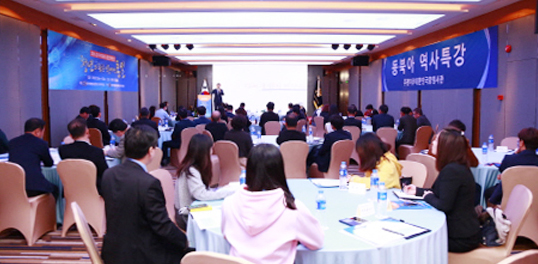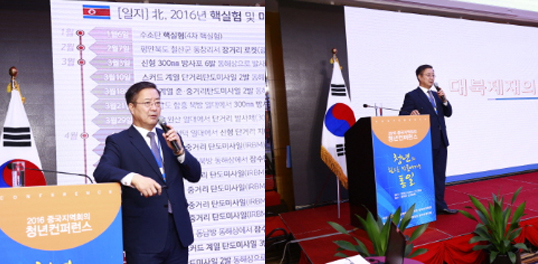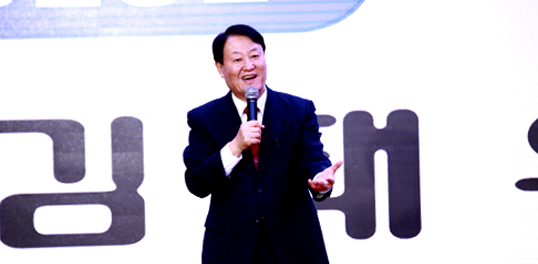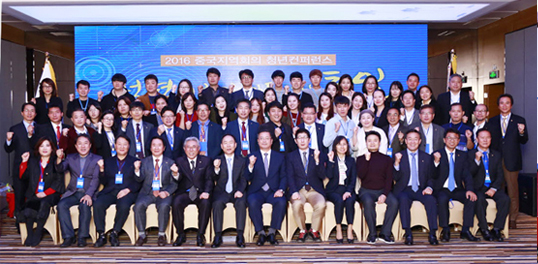“China Council Youth Conference” held in Guangzhou, China
- Cultivating unification leaders in China with the power of the youth
The China Assembly (Lee Chang-ho, Vice-chairperson of the Council of China) of National Unification Advisory Council, the constitutional advisory body directly under the President, held the “2016 China Council Youth Conference” from November 26 to 28 at the Jianguo Hotel Guangzhou with an attendance of about 100 people, including youth members of five chapters in China and youth residents of Guangzhou, international students, and exchanges students.

Overview of the assembly hall
Under the topic of “Unification made by the power of the youth,” this youth conference, which was prepared for expanding the range of consensus on unification and North Korean policies by youth members in China, and activating exchange and communication, consisted of a keynote lecture by Secretary General Kwon Tae-oh, a unification lecture by Professor Kim Tae-woo of Konyang University (former Director of the Korea Institute for National Unification), divided sessions, and a lecture on Northeast Asian history.

Secretary General Kwon Tae-oh is giving a keynote lecture on the topic “The current address of North Korean sanctions.”
While explaining the series of process regarding the nuclear experiment and missile provocations by North Korea in 2016, such as the withdrawal of Gaeseong Industrial Complex, UN Resolution 2270, and the announcement of THAAD deployment, Secretary General Kwon Tae-oh remarked that, “Beginning with the sanction on Dandong Hongxiang Group, sanctions on North Korea expanded to 562 targets. Their effects on North Korea include ‘economic recession in border areas of China and North Korea,’ ‘risk of liquidation on clothes production due to the delayed Chinese permission on the public foreign exchange earning sites,’ ‘increased complaints by overseas Chinese people due to strengthened management of travel documents for Chinese people residing in North Korea,’ ‘illegitimate transactions such as forged dollars, drugs, and fake tobacco by high-ranking officials,’ ‘livestock breeding in the apartment verandas of high-ranking officials living in Pyongyang,’ and ‘exacerbated exploitation of laborers dispatched overseas.’”
Also, Secretary General Kwon said that “Cooperation and supports by China are critical in creating the conditions for unification of the Korean Peninsula through denuclearization and a system change in North Korea,” pleading youth members in China to play the role of diplomats in the private sector.

Unification lecture by Professor Kim Tae-woo of Konyang University
In the unification lecture with the topic of “The North Korean issues and the security order in Northeast Asia,” Professor Kim Tae-woo of Konyang University remarked that, “As the security order in Northeast Asia is being greatly affected by the 5 variables — the rise of China, American checks on China, military re-emergence of Russia, conservative swing and rearmament of Japan, and nuclearization of North Korea — interests among nations are becoming complex and the New Cold War structure is being intensified.” He expressed that North Korean nuclear weapons are working as a pressure on the South Korea and US alliance as North Korea has recently been showing off its nuclear power by threatening South Korea and the United States at the same time, which has worked as a direct factor in South Korea and the US to jointly announce the decision of THAAD deployment.
Professor Kim remarked that "While China is officially participating in sanctioning North Korea, it is essentially continuing a double route for helping the survival of the North Korean regime. It is using the exceptional regulations of Resolution 2270 which it created on its own in order to allow trades of Chinese companies with North Korea and to continue supplying petroleum." He emphasized that "We need to properly recognize 'the relationship between North Korean nuclear problem and unification,' 'the significance of the North Korean nuclear experiment and national security of South Korea,' and 'the view of China on the issue of unification in the Korean Peninsula' in order to think 'what do I have to do' and play a role in making Korea go beyond separation and disputes and advance to a peaceful unification.”

(From the left) Heo Nam-se, Head of Guangzhou Chapter, Hwang Soon-taik, Consul General of the Republic of Korea in Guangzhou, and Lee Chang-ho, Vice-chairperson of the Council of China are giving words of greeting.
In the opening ceremony, Heo Nam-se, Head of Guangzhou Chapter who managed this event, remarked, "Holding the youth conference of China in Guangzhou, one of the three major economic cities of China and a historic site of the liberation movement during the Japanese colonial era, is very meaningful," and urged that, "We youth members in China ought to recognize the importance of grassroots public diplomacy in China, which has the most influence on inducing changes in North Korea for the peaceful unification of Korea, and play a leading role in the unification."
Hwang Soon-taik, Consul General of Republic of Korea in Guangzhou, stressed that, "Korea, which is suffering difficulties in and out of the country, will overcome the situation with wisdom through the spirit of the liberation movement," and added that, "I hope that this opportunity will serve as a meaningful time for discussing and identifying the plans for peaceful unification of our nation in order to take one step further towards unification."
Lee Chang-ho, Vice-chairperson of the Council of China, remarked that, "While the exchange between Korea and China sharply increased for the past 24 years after Korea and China entered into diplomatic relationship in 1992, the relationship stiffened due to the international sanctions of North Korea following the North Korean nuclear missile development and the difference in opinion between the two countries on THAAD deployment in the Korean Peninsula." He expressed his hope that, "This conference will act as an opportunity for increasing trust between the two countries and expanding cooperation for peaceful unification by finding solutions in diagnosing the circumstances of the two countries and expanding diplomacy in the private sector, ultimately creating a spring breeze of peaceful unification that will never freeze again.
Under the topic of “The historical significance of the relationship between Joseon and the Qing Dynasty, and Korea in the 21st century,” Lee Jeong-il, the head of Office of External Affairs and Public Relations at Northeast Asian History Foundation, explained the relationship of the premodern Korean history with China, the universal empire in East Asia, premodern Korean history and Jurchen, and the Second Manchu Invasion of Korea and the 21st century, and remarked that, "In the era of G2, national integration is more important than anything else in the Korean Peninsula, and Korea should advance towards a unified Korea by playing the role of a balance weight in East Asia."
Seo Hyun-ju, senior researcher of Northeast Asian History Foundation, gave a special lecture on Northeast Asia (Korea-China and Korea-Japan relationship) with the topic of “The demise of the Joseon Dynasty and the three types of response by the yangban landlord class,” delivering many implications such as love for our country and the importance of exchange and cooperation with the rest of the world.






